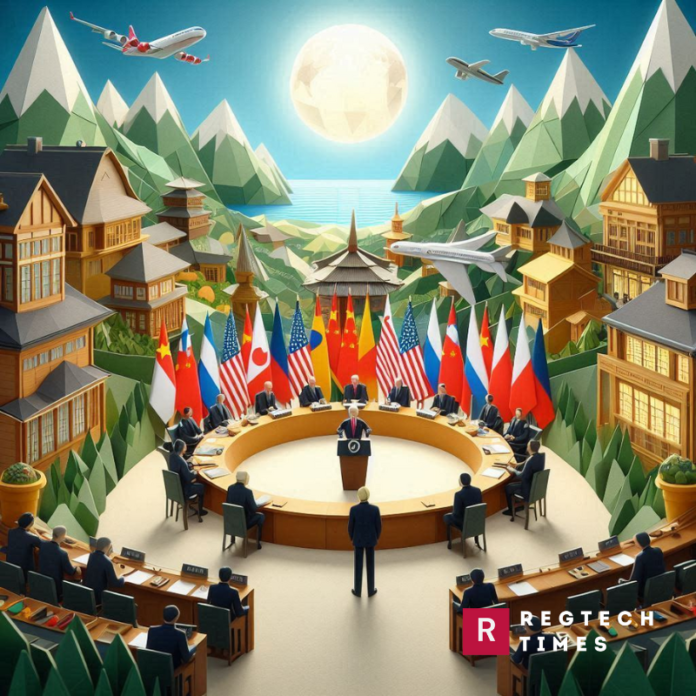As the international community intensifies its efforts to curb Russia’s aggression against Ukraine, the U.S. has introduced secondary sanctions targeting Chinese entities that aid Russia’s military-industrial base. These sanctions, announced in alignment with G7 commitments, represent a significant escalation in the economic pressure on both Russia and China.
Introduction: Context and Rationale
The U.S. Department of the Treasury, in collaboration with the Department of State, has implemented sweeping new measures to restrict Russia’s access to international materials and technology.
These measures include secondary sanctions targeting foreign financial institutions and companies, particularly those based in China, that support Russia’s war economy.
Russia relies on complex transnational supply chains to acquire materials and technology for its military. These networks often involve multiple countries and entities, with China playing a significant role. Secondary sanctions on Chinese companies are intended to break these supply chains and make it more difficult for Russia to obtain the resources it needs.
China has been identified as a significant player in helping Russia evade international sanctions. Chinese companies and financial institutions have been involved in schemes to bypass sanctions and facilitate transactions that support Russia’s war economy. By targeting these entities, the U.S. seeks to close loopholes and ensure that international sanctions are more effective.
Scope and Impact of Secondary Sanctions
President Biden expanded Treasury’s tools on December 22, 2023, authorizing sanctions on foreign financial institutions aiding Russia’s military-industrial base. The definition of Russia’s military-industrial base now includes all persons blocked under Executive Order (E.O.) 14024. This expansion means that foreign financial institutions, including those in China, risk sanctions for facilitating transactions with designated Russian banks such as VTB and Sberbank.
Updated SDN List and International Compliance
To enhance compliance and enforcement, the Office of Foreign Assets Control (OFAC) has updated the Specially Designated Nationals and Blocked Persons List (SDN List). This update includes foreign locations and aliases of sanctioned Russian financial institutions, highlighting their presence in Beijing, Shanghai, and Hong Kong. These updates aim to provide clarity and increase the risk for foreign institutions continuing to engage with these entities.
Restricting Chinese Technology and IT Services
In a coordinated effort with the Department of Commerce, the Treasury has issued a new determination under E.O. 14071. This determination, effective September 12, 2024, prohibits the supply of IT consultancy, design services, support services, and cloud-based enterprise management software to any person in the Russian Federation. This action specifically targets Chinese companies supplying technology and IT services to Russia.
Chinese Companies Under the Microscope
Several Chinese entities have been designated for their roles in supplying critical technology to Russia. Notable companies facing these secondary sanctions include:
- Analog Technology Limited: Based in Hong Kong, this company has shipped high-priority electronic integrated circuits to Russian entities.
- Shandong Oree Laser Technology Co., Ltd.: A machine tool company that has provided metalworking machines to Russia.
- Chongqing Xianuofugeluode International Trade Co Ltd: A prolific supplier of technology to Russia, including integrated circuits.
- HK Nicest Electric Technology Co Limited: Known for supplying high-priority items like tantalum capacitors to Russia-based end-users.
These designations highlight the significant role of Chinese technology in supporting Russia’s military-industrial base and underscore the need for stringent measures to disrupt these supply chains.
Financial Infrastructure and Sanctions Evasion
Sanctions also target key components of Russia’s financial infrastructure, such as the Moscow Exchange (MOEX) and the National Clearing Center (NCC). These entities facilitate investment in Russian defense companies and provide financial services crucial to Russia’s war economy. Chinese financial institutions engaging with these entities are now at heightened risk of secondary sanctions.
Limiting Russia’s LNG Projects
Guided by G7 commitments, the Treasury is targeting entities involved in Russia’s future LNG projects, such as Obsky LNG and Arctic LNG 1 and 3. These measures aim to limit Russia’s future energy revenues and impede the development of new energy projects. Chinese companies involved in these projects are now under scrutiny and risk secondary sanctions.
The introduction of secondary sanctions on Chinese entities marks a significant escalation in the economic pressure on Russia. These measures reflect a broader strategy to isolate Russia economically and technologically, disrupt its war machine, and limit its future revenue streams. The implications for global supply chains and international relations are profound, as countries and companies navigate the increased risk of engaging with Russia.
As the U.S. and its allies continue to tighten the economic noose around Russia, the role of Chinese companies in sustaining Russia’s war economy will remain under intense scrutiny. The success of these sanctions will depend on the international community’s ability to enforce compliance and adapt to evolving tactics of sanctions evasion.


